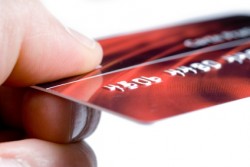 Contact-less credit and debit cards are open to fraud, says consumer group Which?
Contact-less credit and debit cards are open to fraud, says consumer group Which?
Contact-less cards allow people to pay for products or services without entering their PIN.
As part of their investigation into the safety of contact-less card use, Which? bought a number of low cost card scanners from a popular website. They found that they were able to take important data from a variety of contact-less cards, despite the fact that this data is supposed to be coded in order to protect it. The Which? team then used the data to place orders for a number of items, including a television that cost £3,000 in a well-known online shop.
A spokesman for Which? explained that the card scanners enabled them to unlock data from contact-less cards that they could then use to shop online. Although there is a contact-less card transaction limit of £20, the team were able to use the data to spend limitless amounts online. The spokesman added that the team were surprised by how easy it had been to use stolen data in a mainstream online store, along with false names and addresses.
Which? would like debit and credit card holders to be able to opt out of having contact-less cards. At present, all the leading card providers issue them as standard and do not always allow their customers to choose not to have them, if they wish.
Card readers should not be able to read contact-less cards at a greater distance than five cms. However, some are able to read cards from 15 to 20 cm.
Wrapping your contact-less card in metal foil or keeping it in a foil lined wallet is one way of protecting it from being read illegally, said Which?.
Cardholders who are victims of fraud and have not been negligent with their cards are not usually liable for the losses.
Representative 21.54% APRC (Variable)
For a typical loan of £12,000 over 60 months with a variable interest rate of 21.54% per annum, your monthly repayments would be £310.60. This includes a Product Fee of £1,200.00 (10% of the loan amount) and a Lending Fee* of £763.00, bringing the total repayable amount to £18,635.80. Annual Interest Rates range between 8.6% to 27.87% (variable). Maximum 50.00% APRC. *Lending Fee varies by country: England & Wales £763, Scotland £1,051, Northern Ireland: £1,736.
Think carefully before securing debts against your home. Your home may be repossessed if you do not keep up repayments on your mortgage or any other loan secured against it. If you are thinking of consolidating existing borrowing, you should be aware that you may be extending the terms of the debt and increasing the total amount you repay.

